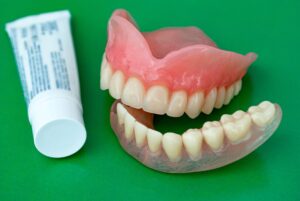
Dentures are the tried-and-true method of refilling your grin after tooth loss because they restore so much of your ability to eat and speak more like you used to. If they don’t fit, however, you might start to feel anxious. What if they become dislodged in the middle of a meal or conversation and embarrass you? Fortunately, denture adhesive can help them form a stronger bond so that you can set your mind at ease about your artificial teeth. There are several choices when it comes to denture glue, so how do you know which is best? Keep reading to learn more about the different types so you can decide!
Type #1: Denture Creams
One 2014 study found that denture creams can create a better hold than the alternatives. It comes in a tube and can be applied in small amounts on wet dentures directly to the area that connects with your ridges. The placement can be different on your top (maxillary) versus lower (mandibular) arches, so it’s important to follow any included instructions. Next, you’ll insert your restoration and bite down to allow the seal to form. The cream then absorbs the moisture in your mouth and expands to create a tighter suction against your gums. It seals out unwanted germs and food particles and is often recommended when your dentures mostly fit but have begun to loosen.
Type #2: Denture Powders
Denture powders can keep your artificial teeth more firmly rooted for the entire day, and many patients report that they’re easier to use than creams. Instead of squeezing a designated amount onto specific areas, you sprinkle this powder over the entire surface that touches your gums. You may need to shake off any excess, but then you can insert your dentures and bite down to keep them in place. These are also recommended when your dentures need some extra help to stay in place but aren’t poorly fitting.
Type #3: Denture Adhesive Strips
Denture adhesive strips are often considered the most convenient choice because they involve applying pre-cut pieces that already have the right amount of glue. This eliminates a lot of potential mess from using too much product. To use, you’ll peel open the strip and moisten it in water before applying it to the undersurface of your restoration. Then you’ll put them in your mouth and hold them down for a few moments to form the seal. This method can work well even on poorly-fitting dentures.
If you’re still having a hard time selecting an appropriate adhesive, you can ask your dentist for help. They’ll be able to provide insight based on your dental condition so that you can continue to make the most of your dentures!
About the Practice
At Jupiter Implant and Cosmetic Dentistry, patients benefit from a husband/wife dental duo that provides a full range of services to enhance their oral health, including dentures. They’re both highly accomplished professionals with years of specialized training and real-world experience. Whether you need a basic checkup, a restoration, or a full mouth reconstruction, they can help. If your dentures aren’t fitting like they used to and you need help, you’re welcome to request an appointment on the website or by calling (561) 559-8942.
